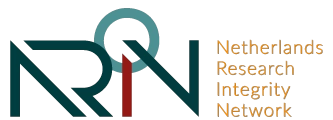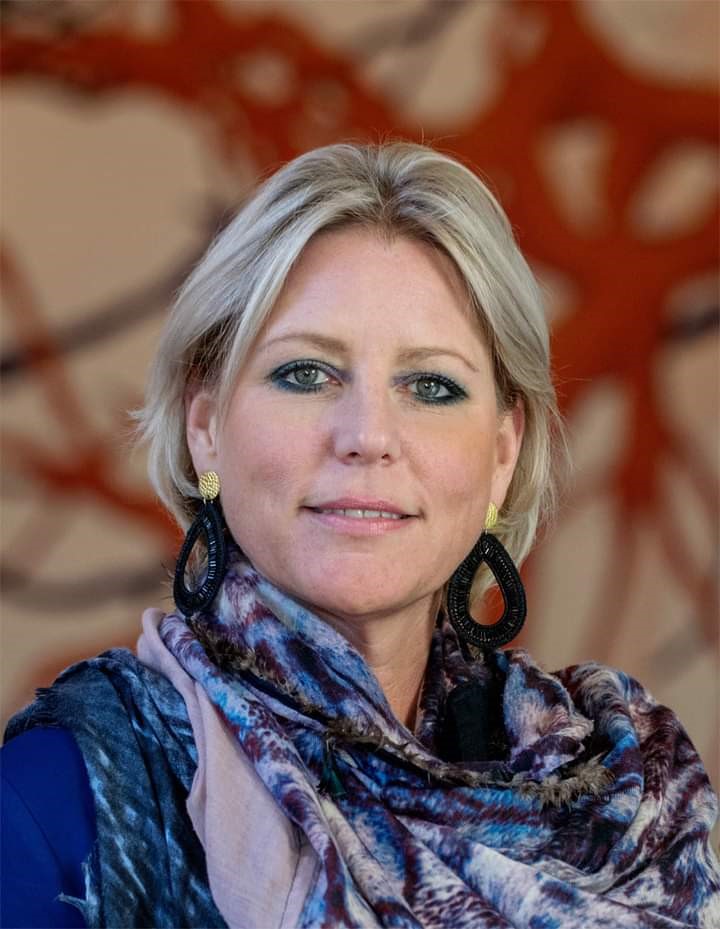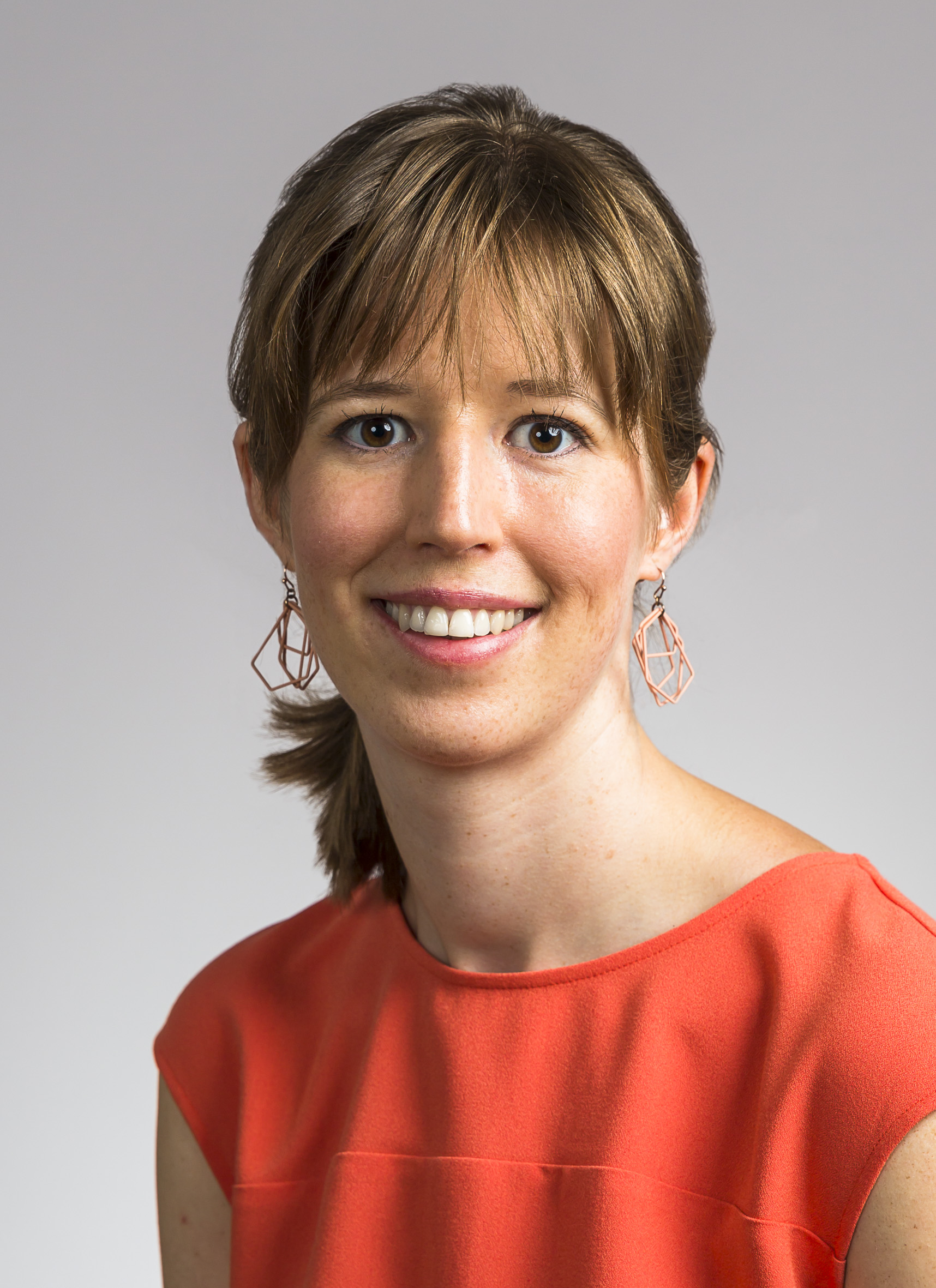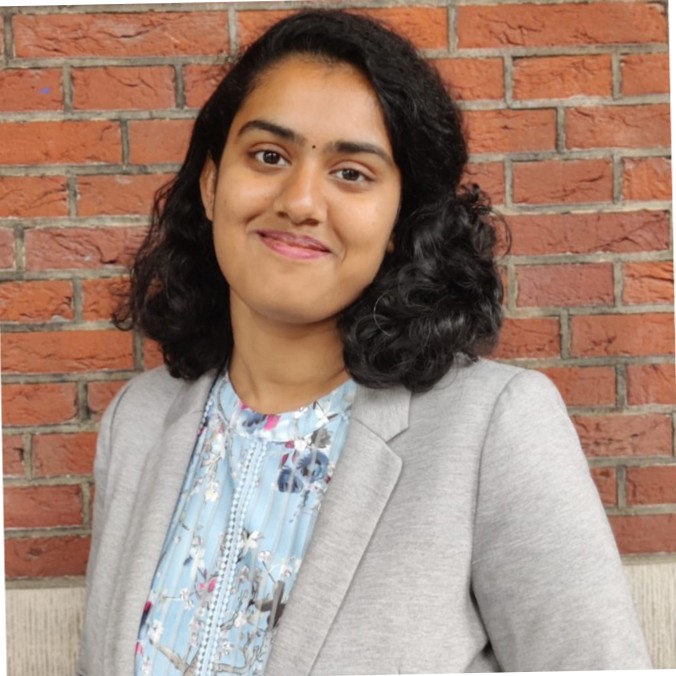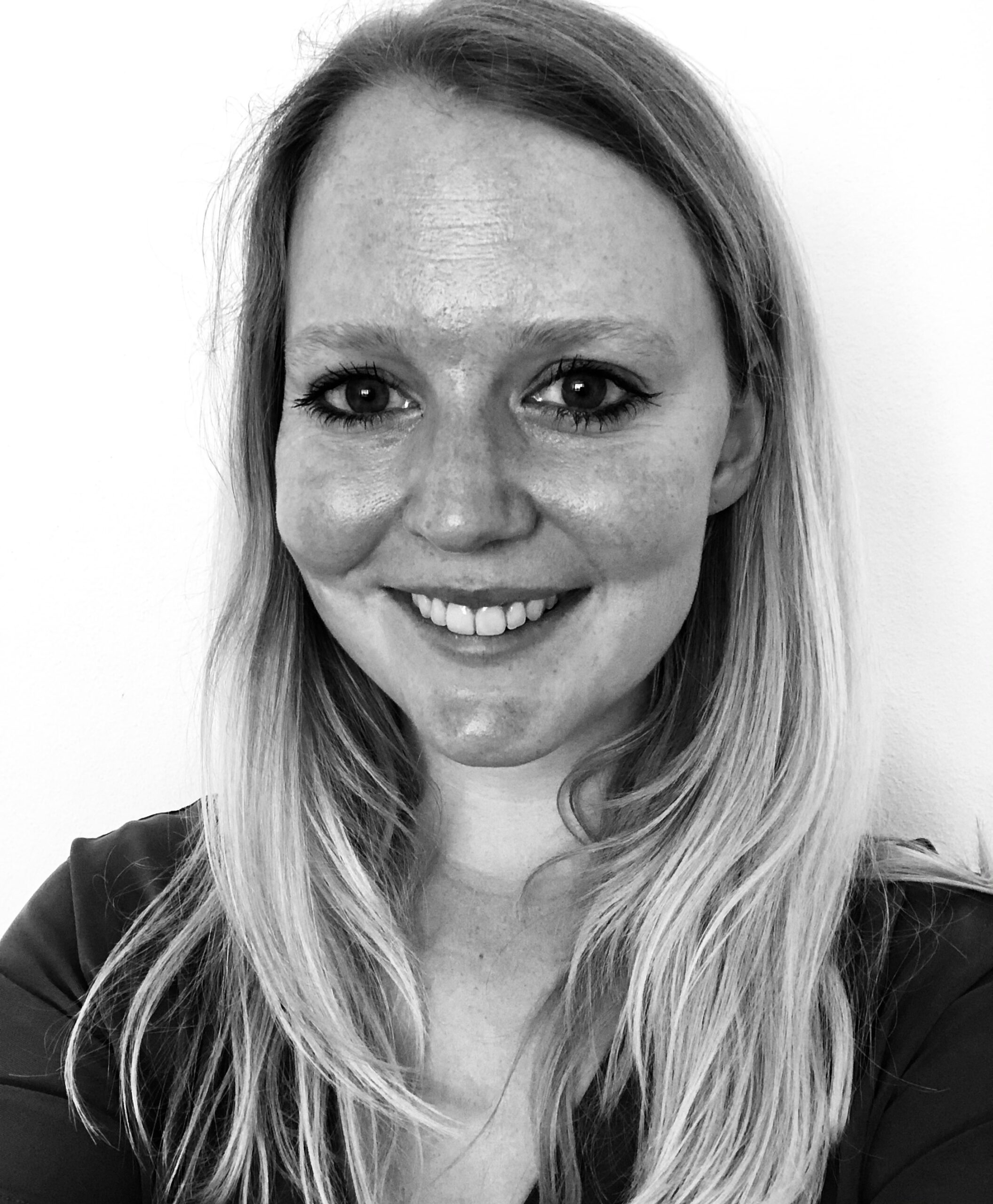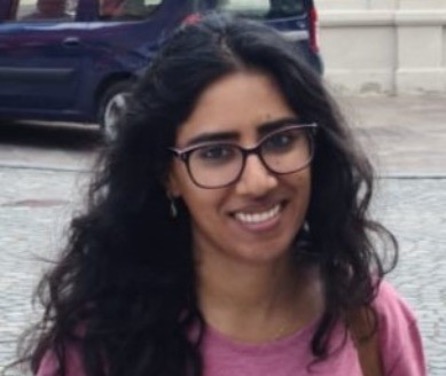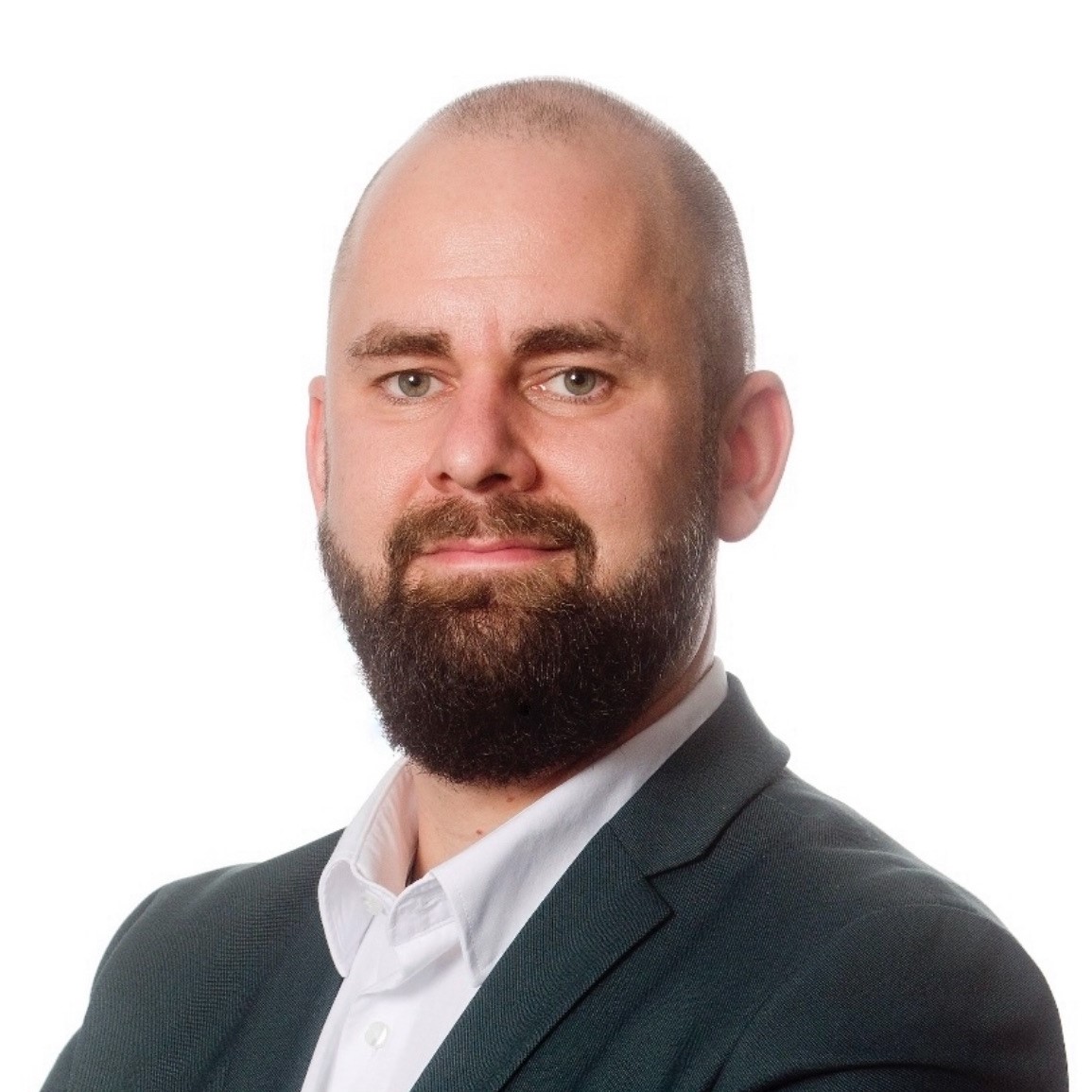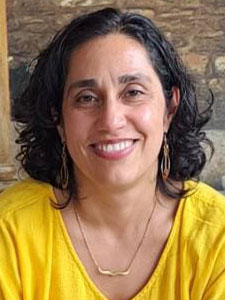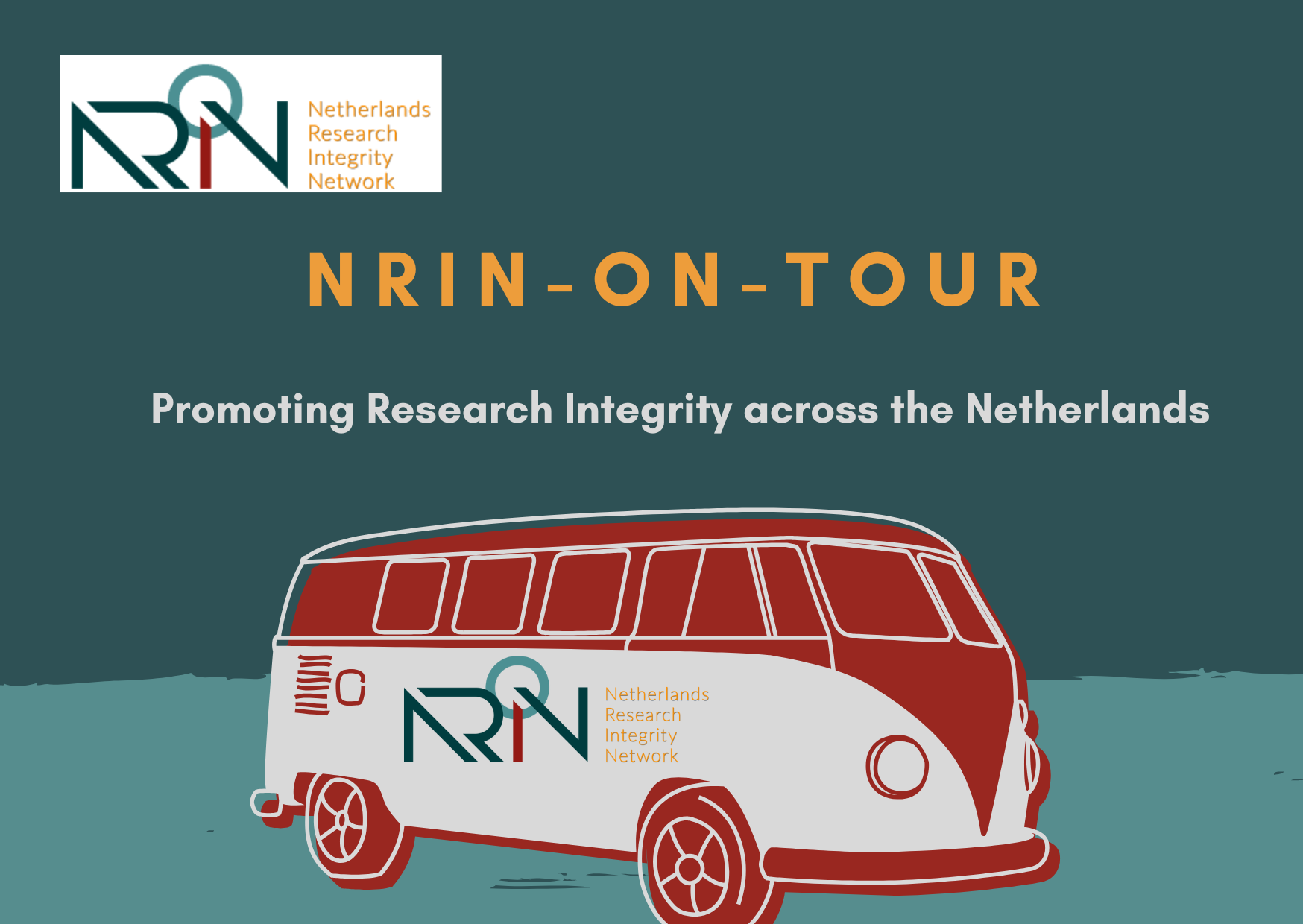
The NRIN-on-Tour aims to engage the Dutch and international scientific communities in a dialogue on the current challenges and opportunities to foster responsible research practices at Higher Education Institutions.
The NRIN-on-Tour will host onsite sessions across Dutch Universities and Universities of Applied Sciences, with online streaming to those outside the Netherlands and those unable to travel to the host institution.
In each session, experts from the host institution will present a relevant topic related to Research Integrity, Open Science, and Responsible Conduct of Research and discuss with the audience the challenges and opportunities related to the topic presented. The onsite and online participants will be invited to ask questions and engage in an interactive dialogue with the speaker and audience.
Each session will be recorded and later included on the NRIN-on-Tour page
Would you like to share your latest research on the topics above? Would you like to be part of the NRIN-on-Tour as a host? Feel free to email us at info@nrin.nl! We would be delighted to organise a session together!
Key Information
When
There is no fixed periodicity for the NRIN-on-Tour sessions. The dates for each session will be decided with the host institution
Where
Hybrid – onsite and online (Zoom)
Topics
Various on Research Integrity / Ethics, Open Science and Responsible Conduct of Research.
Lecturers
Experts in the field of good scientific practices.
Audience
Students (including bachelor and master students), early career researchers (including PhD candidates and junior researchers), senior career researchers and academics, policy makers and anyone with an interest in the topics presented. Both in the Netherlands and internationally.
Language
English.
Price
Free.
Registration
Required. Those attending online will receive a zoom link prior to the session
Past Programme
(scroll down for more details)
Landelijk train-de-trainer event over onderzoeksintegriteit op hogescholen
HAN Hogescholen
31st October 2025, 10:00 – 16:00 CET
From the Dutch Recognition & Rewards Programme to CoARA: new developments and opportunities, by Professor Rianne Letschert (President of Maastricht University)
Panel session – Diversity and Inclusion in Researchers’ Assessment (confirmed panellists: Dr. Krishma Labib – VU Amsterdam; Robbert Hoogstraat – University of Humanistic Studies; Andrea Reyes Elizondo – Leiden University; Dr. Bruna Calado – Maastricht University)
Maastricht University
9th April 2025, 13:30 – 16:30 CET
Hackathon on Sustainability in Academia (in celebration of Andrea Kis’ PhD defence)
TU Eindhoven
30th January 2025, 11:00 – 16:00 CET
Upcoming NRIN-on-Tour Sessions
Landelijk train-de-trainer event over onderzoeksintegriteit op hogescholen
HAN, Kapittelweg 33, Nijmegen
31 oktober 2025 – 10.00 tot 16.00 (tijdstippen zijn nog niet definitief)
Werk jij als trainer met onderzoekers aan verantwoord onderzoek? Of geef je als docent onderwijs aan studenten over onderzoeksintegriteit? Dan nodigen we je graag uit voor het eerste landelijke train-de-trainer event over onderzoeksintegriteit op hogescholen!
Op vrijdag 31 oktober 2025 organiseren het NRIN*, de HAN en het Netwerk OIIO** een inspirerende dag vol uitwisseling, ideeën en praktische tools rondom het geven van training en onderwijs over verantwoord onderzoek aan zowel onderzoekers als studenten.
We starten met een plenair programma en gaan daarna in twee groepen uiteen, afgestemd op jouw rol en doelgroep.
Ben je geen trainer of docent, maar wél geïnteresseerd in (het geven van) training/onderwijs in verantwoord onderzoek, dan ben je ook welkom!
**OnderzoeksIntegriteit In (hbo)Onderwijs, voorheen netwerk Didactisering van Onderzoeksintegriteit voor het hbo
Past NRIN-on-Tour Sessions
From the Dutch Recognition & Rewards Programme to CoARA: new developments and opportunities
Maastricht University (School of Business and Economics (SBE), Tongersestraat 53, aula (H0.01)
- Dr. Krishma Labib – VU Amsterdam
- Robbert Hoogstraat – University of Humanistic Studies
- Andrea Reyes Elizondo – Leiden University
- Dr. Bruna Calado – Maastricht University
Reading Resources from the Panel Discussion (books, articles, papers, and additional formats):
- Invisible Women: Exposing Data Bias in a World Designed for Men by Caroline Criado Perez (link)
- Complaint! by Sara Ahmed, on how structures of power work to defuse complaints at universities (link)
- On Being Included: Racism and Diversity in Institutional Life by Sara Ahmed, on how diversity is used and performed at universities. (link)
- Who’s Afraid of Gender? by Judith Butler. (link)
- So You Want to Talk About Race by Ijeoma Oluo (link)
- We Should All Be Feminists by Chimamanda Ngozi Adichie (link)
- White Innocence by Gloria Wekker (link)
- Hello Witte Mensen by Anousha Nzume (Dutch; link)
- Alledaags Racisme - Philomena Essed (Dutch; link)
- ‘Silence is complicity’ — universities must fight the anti-DEI crackdown by Rebecca Calisi Rodríguez (link)
- ‘Now is not the time for despair’ — how scientists can take a stand against political interference by Fernando Tormos-Aponte (link)
- Judith Butler interview in El País (link)
- Decolonial framework for applying reflexivity and positionality in global health research. Naidu T, Gingell G, Zaidi Z. (link)
- Ruha Benjamin Reading List (Bellarmine Forum 2024) (link)
- Decolonizing Science Toolkit (link)
From the Dutch Recognition & Rewards Programme to CoARA - new developments and opportunities
In her presentation, Rianne will explain the most important features in the Roadmap regarding Recognition and Rewards that was adopted by all partners, and will also elaborate where developments move fast and slow. She will also explain the main features of COARA and the most important results of the last two years and ambitions for the coming period. She would like to engage in a lively discussion with the audience where they see opportunities and concerns.
About the speaker
Prof. dr. Rianne Letschert (1976) is President of Maastricht University since November 2021. She was Rector Magnificus of Maastricht University from September 2016 till February 2022. She studied International Law at Tilburg University, the University of Amsterdam and the University of Montpellier. From April to August 2010 she was a Visiting Research Fellow at the Lauterpacht Centre for International Law at the University of Cambridge (UK), and Research Fellow of Clare Hall, Cambridge, of which she is lifelong member. In 2014, she was Visiting Professor at the University of Barcelona. In 2012, Letschert joined De Jonge Akademie (Young Academy) of the Royal Netherlands Academy of Arts and Sciences of which she became chairperson in April 2015.
She has authored and edited several book publications and articles in national and international journals. She also served as director of the International Victimology Institute (INTERVICT/Tilburg University), where she established a master’s degree in Victimology and Criminal Justice, which quickly attracted many national and international students from different academic disciplines.
Working in an interdisciplinary team has greatly influenced her own scientific development. In May 2015, she and her team were awarded a Vidi grant by the Netherlands Organisation for Scientific Research to study the impact of international tribunals on societies and individuals that have been confronted with serious human rights violations and international crimes. She has always dedicated a lot of time to translating scientific knowledge into societal impact. For example, she was an expert consultant on behalf of the victims at the Special Tribunal for Lebanon, she gave several public lectures and her extracurricular positions are related to socially relevant themes.
One of her main tasks as the administrative co-leader of a national programme ‘Recognition and Rewards’ by the Dutch Association of Universities is to implement the position paper ‘Room for Everyone’s Talent‘, not only in Maastricht but in the entire academic sector. Her role as President of CoARA in 2023 and 2024, the Coalition for Advancing Research Assessment which relates to the reform of research assessment, fitted perfectly in her ambition to fundamentally reassess the career paths and opportunities of academic staff.
In March 2023, she became chair of the Advisory Committee of the National Growth Fund. She is also member of the Supervisory Board of Catharina Hospital (Eindhoven) and Fund for Victim Support.
About the Chair
Gowri Gopalakrishna is an epidemiologist by training who led the Dutch National Survey on Research Integrity, one of the world’s largest and most comprehensive studies on research integrity and responsible conduct of research. She is currently assistant professor at Maastricht University where she teaches and conducts meta-research on research integrity, research ethics and open science. She is also research fellow at the Department of Epidemiology and Data Science, Amsterdam University Medical Centers where she works on the same topics. Some of her most significant contributions include the control and prevention of the SARS epidemic in 2003 for which she received a national public service medal, in recognition for her contribution towards the control of the SARS outbreak in Singapore, and the rest of the world. She has coordinated and been involved in setting up several strategic and expert advisory committees in her career as an epidemiologist at the international level, working with the CDC in the US, WHO, Health Canada, and various Ministries of Health. Dr Gopalakrishna is co-author of The Cape Town Statement on fairness, equity and diversity in researchand Board member of Maastricht University’s Platform on Research Ethics and Integrity as well as the Netherlands Reproducibility Network.
About the Invited Guests
Dr Karen Stroobants is a co-Founder of CultureBase, a consultancy that supports research organisations to improve how research is done. Specialising in research culture and assessment, she developed the Royal Society of Chemistry’s science culture vision in 2023 and co-delivered the Royal Society’s research culture programme in 2018. Karen was the penholder for drafting the Agreement on Reforming Research Assessment in 2022, and has been Vice-Chair of the Coalition for Advancing Research Assessment (CoARA) since 2022. She is also on the External Advisory Group of the University of Cambridge Action Research on Research Culture project.
Mayukha is a PhD candidate at the Netherlands Cancer Institute and a board member of the Promovendi Network Nederland (PNN), the national interest group for and by Dutch PhD candidates. At PNN, she represents the perspective of PhD candidates in the national Recognition & Rewards steering group as well as in other committees related to Open Science.
Panel session - Diversity and Inclusion in Researchers' Assessment
About the Chair
Dr. Hanne Zimmermann is an Assistant Professor of Applied Social Psychology at Maastricht University (Netherlands). She is an interdisciplinary social scientist and mixed-methods researcher. Broadly defined, her work focuses on understanding and reducing disparities in accessing health care and sexual health options among several marginalized groups (including LGBTQ+, sex workers, migrants and refugees). Her work is strongly informed by principles of participatory research and is carried out in close collaboration with target populations, professionals and policy makers. In addition, she is involved in various projects to promote the visibility of inclusivity and diversity in research, such as through her involvement in the Dutch version of the Diversity Minimal Items Set (DiMIS) and the development of a pre-registration form that helps researchers to think in advance about inclusivity and diversity in every step of the research process.
About the panel members
Krishma Labib is an Assistant Professor at the department of Philosophy at the VU, as well as the Coordinator of the Amsterdam Center of Expertise for Research Integrity and Open Science (RIOS). Her research focuses on issues of justice and injustice regarding research integrity and open science. She is particularly interested in how research integrity and open science initiatives may unintentionally reproduce injustice in research, and is exploring ways to bring awareness to this, as well as resist and prevent it. Additionally, she is leading IDEA, a CoARA funded project at the VU examining how to integrate diversity considerations in the recognition and rewards reforms taking place at the university. Prior to this, Krishma completed her PhD on how research institutions can foster research integrity, in which she developed – together with colleagues from the SOPs4RI project – guidelines to institutions on responsible conduct of research education, supervision and leadership, as well as a responsible research culture. Krishma is also coordinating the PhD research integrity course at the Humanities Faculty of the VU, as well as teaching in bachelor students at the VU and AUC.
Robbert Hoogstraat is Head of Research and Valorisation at the University of Humanistic Studies in Utrecht. He has a background in philosophy and sociology and has previously worked at NWO (the Dutch Research Council). At NWO he was a senior policy officer and project leader for the Rewards & Recognition programme and worked on research assessment (e.g. the NWO evidence-based CV). In his current role he is a committee member for R&R, is active in CoARA and is the Chief Open Science for his university.
Andrea Reyes Elizondo is a researcher at the Centre for Science and Technology Studies (CWTS), Leiden University. She has carried research on the networks between academic institutions and health science systems around the world, research integrity, and citizen science. Currently she is working on two Open Science projects: GraspOS (Horizon) and the National Coordination for local projects (OpenScienceNL). She is also a self-funded PhD student at the Leiden University Centre for the Arts in Society (LUCAS) working on the reconstruction of Reading Spaces in New Spain during the eighteenth century.
Hackathon on Sustainability in Academia
TU Eindhoven, Vertigo 5.07 - 13:00 (starting with lunch 13:00-14:00, then hackathon 14:00-16:00)
Join us at TU Eindhoven or online (Zoom) for an exciting and collaborative hackathon inspired by the themes of Andrea Kis’ dissertation on the sustainability of scientific systems. Hosted by NRIN as its inaugural “NRIN-on-Tour” event, this hackathon will bring together researchers, experts, and stakeholders to tackle key challenges in academia, including academic mental health, research reliability, and the experiences of PhD candidates.
Participants will work in small groups* led by committee members and invited guest experts to brainstorm, discuss, and develop actionable solutions or ideas for follow-up research, initiatives, and programs. Over 2 hours, each group will focus on a central theme, culminating in a presentation of innovative outcomes.
Let’s collaborate to shape a more sustainable and inclusive academic future!
*Those attending online will be able to actively share their ideas and engage with other group members!
Hackathon themes
Dr. Krist Vaesen (TU Eindhoven)
The under-usage of open research data
Thanks to the Open Science movement, researchers have become accustomed to openly sharing their research data. However, recent evidence suggests (!) that, unfortunately, of the tons of open data that already have been shared, only a tiny fraction actually gets re-used by others (e.g., to carry out replications or further develop ideas). In this panel, we will identify strategies for determining the extent of the problem and strategies for solving it.
Dr. Daniel Lakens (TU Eindhoven)
Improving the PhD experience in Academia
PhD students are responsible for a large share of the research that is performed at Universities. In many fields the work PhD students do is quite individualistic, as they spend 4 years on their own research project. How can we improve this experience? Would working in more coordinated research projects improve PhD life?
Professor Wybo Houkes (TU Eindhoven)
Responsible Hiring in Academia
Finding a position in academia is a frustrating, time-consuming process — and so is hiring someone. The typical tenure-track position gets hundreds of applications, requiring committees to review thousands of pages. Is it possible to do the selection responsibly and efficiently? How can the overall workload for applicants be minimized? Which parts of the current process should we omit? Which should we add? Are there any practices outside academia that can be adopted?
PhD defence title: Surviving academia - Studies on the sustainability of science and academic careers
Open invitation - TU Eindhoven promotion room, Atlas 0.710 (11:00 - gather starting 10:30, doors close at 11:00 sharp)
This doctoral thesis explores the sustainability of scientific systems with a focus on the human aspects of science, particularly researchers. It addresses three interrelated themes: (1) the experiences of early-career researchers in their work environments and career trajectories, (2) the psychological values influencing academic researchers’ decisions, and (3) the sustainability of science in terms of knowledge reliability and the longevity of the academic system. Using a mixed-methods approach, including conceptual analysis, interviews, surveys, and statistical methods, the thesis emphasizes a human-centered perspective on barriers to sustainability in science.
The dissertation comprises six chapters. Chapter 2 examines PhD candidates in the Netherlands, highlighting challenges such as inadequate supervision and unhealthy research environments, which contribute to career dissatisfaction and attrition, countering sustainable development goals. Chapters 3 and 4 introduce and validate the Academic Research Values scale, underscoring the importance of understanding researchers’ values to enhance scientific careers and inclusivity in academia. Chapter 5 integrates these topics through a sustainability framework, addressing systemic flaws in academia by linking knowledge reliability with workforce longevity and proposing solutions for a more sustainable scientific system.
About the PhD candidate:
Andrea Kis is a PhD candidate at TU Eindhoven, dedicated to exploring the experiences of researchers and the interplay between psychological and environmental factors in academia. Her research focuses on fostering sustainability in science and academic careers.
Andrea earned her MSc in Environmental Psychology from the University of Groningen, building on a multidisciplinary foundation as a Behavioral Analyst, Information Scientist, and Designer. Her interdisciplinary perspective and commitment to (social) sustainability are evident in her active involvement with initiatives like NRIN, ReMO, FORRT, WISE, the Low Carbon Initiative, and Social Safety groups.
Beyond research, Andrea serves as a Mental Health Ambassador and engages in science communication and policy advocacy, leveraging her work to promote a healthier and more sustainable academic environment.
